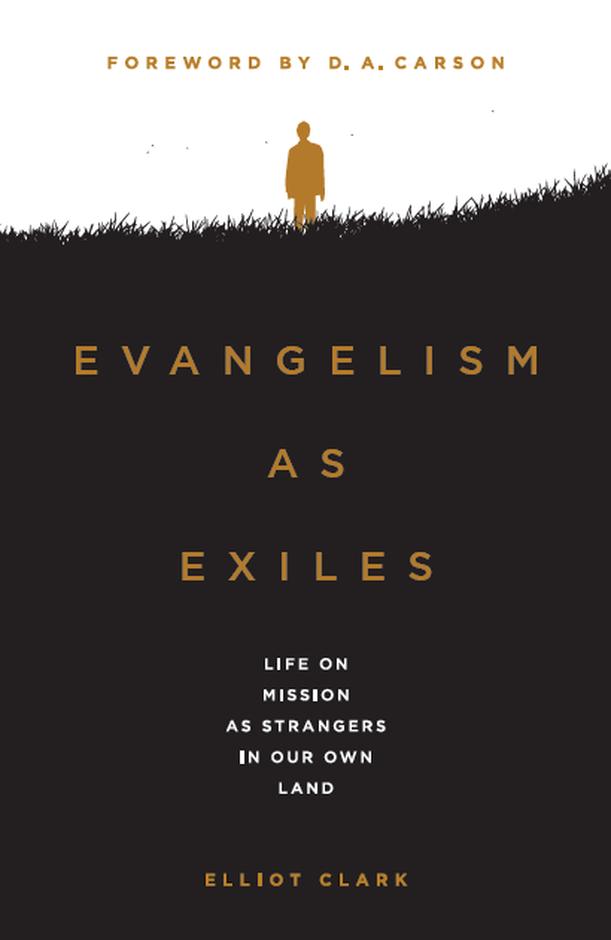Gone are the days of evangelistic crusades, when people filled churches, stadiums, or open spaces to hear the gospel. The days of the great evangelists like Billy Graham, Festo Kivengere, P. D. Chiweshe, and Frank Retief, are far behind us. Openness to faith and religion is on the decline. And, in many places, the world is becoming increasingly hostile to the gospel. This makes me all the more grateful for Elliot Clark’s short but superb book, Evangelism As Exiles.
How do we faithfully carry out our evangelism mandate in an increasingly hostile environment?
The close relationship between church and state is vanishing. Cultures are increasingly diverse, though less and less and approving of traditional values. The Church is quickly losing its voice in society. Thus a major question and challenge facing the Church is this: How do we faithfully carry out our evangelism mandate in such an environment?
Clark provides us with a robust framework for engaging our day and age. He helps us make the necessary adjustments in our approach to evangelism. Because the world around us is constantly changing, as the Church we need to realise that our methods of gospel proclamation must change too. Evangelism As Exiles is a primer for those important shifts.
A Handbook For Living As Strangers
Clark builds his framework on how to be faithful witnesses in a hostile environment from 1 Peter. Peter wrote to exiled believers encouraging them to live in exile as faithful witnesses. Evangelism As Exiles first encourages Christians to embrace their identity as exiles in this world (1 Peter 1:1-2). This identity is grounded in the hope of our glorious home to come (1 Peter 3:15). Many Christians live in a hostile world. Some live in constant fear because of their faith. Thus Clark challenges us to fear God more than man, while showing respect towards all (1 Peter 1:17; 2:13-17).
Once we counter the fear of man with the fear of God, we can boldly declare his gospel.
Once we counter the fear of man with the fear of God, we can boldly declare God’s worthiness and his gospel (1 Peter 2:9–10). Christians can embrace living differently, even enduring hardship and opposition, because they know the beauty of Christ (1 Peter 2:11–12). Evangelism As Exiles ends with a wonderful reflection on the eschatological hope of glorification when Christ comes again, to dwell with us. It is that hope of finally being with him that makes us bold witnesses of the coming kingdom (1 Peter 4:8–10).

Evangelism as Exiles: Life on Mission As Strangers In Our Own Land
Elliot Clark
Evangelism as Exiles: Life on Mission As Strangers In Our Own Land
Elliot Clark
Whether we’re in positions of power or weakness, influence or marginalization, all of us are called to live and witness as exiles in a world that’s not our home. This is our job description. This is our mission. This is our opportunity.
A church in exile doesn’t have to be a church in retreat.
Evangelism Is An Expression Our Eternal Hope
A repeated and emphasised theme in Evangelism As Exiles is the Christian’s living hope. This hope is ingrained in our DNA. It is what distinguishes believers from the world. But it isn’t only our identity. It is also a necessary component of our witness. We will only embrace our difference without shame, in a world where our cultural strength and social influence are diminishing, once our hearts have been grabbed by the reality of this eschatological hope.
Hope is a necessary component of our witness.
As Clark argues, possessing this hope does not lessen our dread of evangelism. Rather, the Christian hope refocuses that fear. Rather than letting fear of our potential rejection by the world throttle our evangelism drive, this hope grips us with the fear that those found not in Christ will be rejected. Thus, our fear primarily becomes focused on the fact that our loved ones will be rejected by God if they continue in living apart from Christ. Hence, in fear, despite potential rejection, we become more passionate in evangelism.
Clark goes as to suggest that “we actually don’t seem fearful enough, not nearly as exasperated or concerned about the certain and dreadful end of our unbelieving neighbours as we should be” (p22). Our fear to evangelise can only be countered by the fear of the coming judgement. So, we evangelise because we believe that the hope we know as Christians has the power to save anyone who will believe (Romans 1:16-17).
Genuine Love Must Precede Telling
If our hope is the motivator, what tools do we have for evangelism as exiles? Clark’s personal examples from his time as a missionary in Asia demonstrate again and again that genuine love is the greatest tool. He shares how he reached Muslims with the gospel by simply opening his family home and showing hospitality. Evangelism is love. It’s genuine love shared with your neighbour, rather than angling for opportunities to Bible bash. Let’s not forget that Jesus loved and died for sinners, for his enemies (Romans. 5:8).
We might no longer be able to fill stadiums, sharing the gospel with thousands, like the Billy Grahams did. But we can fill our homes. We can share our ordinary lives.
To follow in the footsteps of the crucified king is to walk in exile, boldly proclaiming his message of good news. This gospel invites all into honour. It grants a home to those who believe. That is the hope of future glory. Therefore, since we were welcomed into an eternal home, made possible by God’s extravagant love, we too should open our homes and make our dinner tables into pulpits.
Hospitality is one way of tangibly sharing the good news of God’s eternal home.
Hospitality is one way of tangibly sharing the good news of God’s eternal home, here and now. It’s preparing a table in the presence of our enemies. The only requirement of hospitality is love. Gospel love serves others rather than serving ourselves. It is a love that seeks to use all our resources to introduce people to Jesus (p142). Therefore, one of the greatest tools for evangelism is simply love.
For Exiles, Evangelism Is Rarely An Event
Clark warns us against living our daily lives with a lack of missional focus and a lack of daily intentionality towards those around us. Most of us have fallen into the danger of a compartmentalised view of mission. We have pushed all our missional efforts towards short term missions or evangelistic outreaches.
We’ve pushed all our missional efforts towards evangelistic outreaches.
Not that these are bad. The problem is that outreach becomes what we do at certain times and places. So we make evangelism an event or program, ignoring the interconnectedness of witness and daily life. We struggle to live out the truth that effectiveness in evangelism demands both our words and also our way of life (p152). 21st century evangelism will only be fruitful if we invest more time in creating intentional friendships.
Evangelism As Exiles was primarily written for an American audience. However, I genuinely believe it’s a book worth reading for most Christians, even us in Africa. Not only does it address the Church at large, but it’s presented in such a way that challenges individual believers. It is a book that shapes a healthy approach to evangelism.














